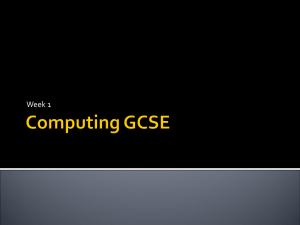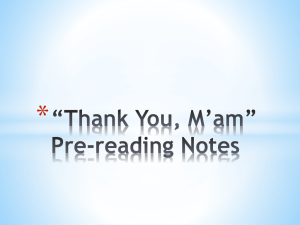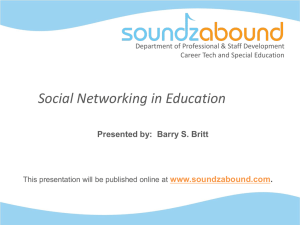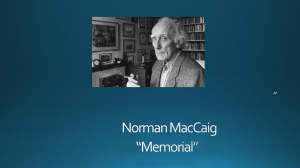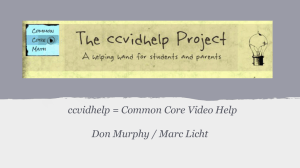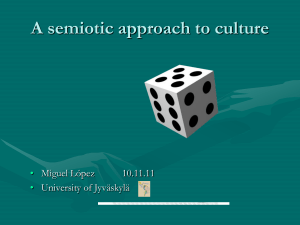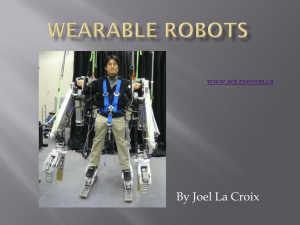Syllabus - WordPress.com
advertisement
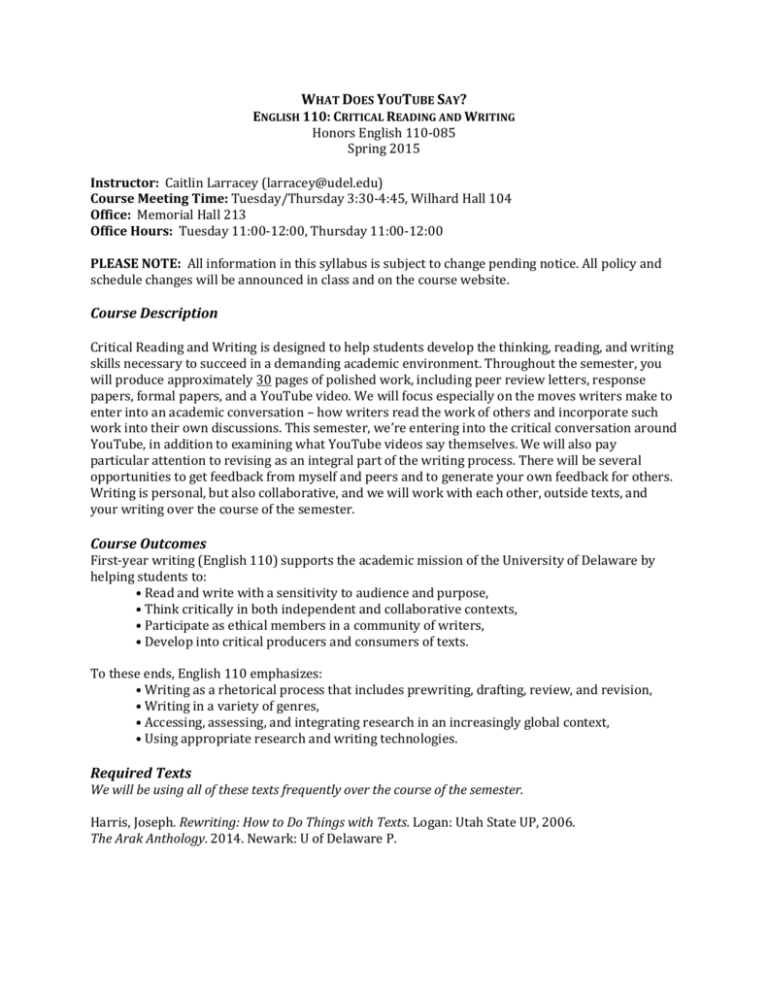
WHAT DOES YOUTUBE SAY? ENGLISH 110: CRITICAL READING AND WRITING Honors English 110-085 Spring 2015 Instructor: Caitlin Larracey (larracey@udel.edu) Course Meeting Time: Tuesday/Thursday 3:30-4:45, Wilhard Hall 104 Office: Memorial Hall 213 Office Hours: Tuesday 11:00-12:00, Thursday 11:00-12:00 PLEASE NOTE: All information in this syllabus is subject to change pending notice. All policy and schedule changes will be announced in class and on the course website. Course Description Critical Reading and Writing is designed to help students develop the thinking, reading, and writing skills necessary to succeed in a demanding academic environment. Throughout the semester, you will produce approximately 30 pages of polished work, including peer review letters, response papers, formal papers, and a YouTube video. We will focus especially on the moves writers make to enter into an academic conversation – how writers read the work of others and incorporate such work into their own discussions. This semester, we’re entering into the critical conversation around YouTube, in addition to examining what YouTube videos say themselves. We will also pay particular attention to revising as an integral part of the writing process. There will be several opportunities to get feedback from myself and peers and to generate your own feedback for others. Writing is personal, but also collaborative, and we will work with each other, outside texts, and your writing over the course of the semester. Course Outcomes First-year writing (English 110) supports the academic mission of the University of Delaware by helping students to: • Read and write with a sensitivity to audience and purpose, • Think critically in both independent and collaborative contexts, • Participate as ethical members in a community of writers, • Develop into critical producers and consumers of texts. To these ends, English 110 emphasizes: • Writing as a rhetorical process that includes prewriting, drafting, review, and revision, • Writing in a variety of genres, • Accessing, assessing, and integrating research in an increasingly global context, • Using appropriate research and writing technologies. Required Texts We will be using all of these texts frequently over the course of the semester. Harris, Joseph. Rewriting: How to Do Things with Texts. Logan: Utah State UP, 2006. The Arak Anthology. 2014. Newark: U of Delaware P. Course Policies Attendance You must be present in order to succeed in this course. You are allowed to miss three class meetings. I do not differentiate between excused and unexcused absences, so use your absences wisely. Any absence after the third, regardless of the reason, will drop your final grade by 1/3 a letter grade. For peer review days, bear in mind that the work you do in class is graded; these will be the days you do not want to miss. Furthermore, absence is not an excuse to miss due dates; you submit your work electronically, so if your assignment is due, it must be submitted by class time. Lateness Arriving late disrupts the class. Two tardies (showing up to class 5 or more minutes late) will equal one absence, and that counts toward your allowed absences. If you are more than 25 minutes late, you will be marked as absent. Also, leaving class early will constitute a tardiness. Emergency Absences If serious illness, family emergencies, or other crises occur during the term, one of the key things you must do is to contact the Dean of your College as soon as possible. This office can assist you in notifying faculty and in validating for your teachers what has happened. Such validation will be necessary for you to make up missed classwork and assignments. Email Communication I will contact you through your UD e-mails, so if you don’t check it, make sure your UD e-mails are forwarded to your primary account: http://www.udel.edu/it/help/webmail-mirapoint/webmailforward-all-incoming-mail.html. I check my e-mail very frequently (probably too much), and this means e-mail is the best way to reach me with any questions, comments, or concerns. I will respond as quickly as possible, and generally within 24 hours. Please, use proper e-mail etiquette: write with respectful, polite, and appropriate tone and formatting. Also, please put something in the subject line that clearly labels your message, and that tells me who exactly is sending this e-mail. Just imagine if your inbox was flooded with forty e-mails titled “Question.” Technological Excuses Computers, internet, and email are going to be integral parts of your professional lives. I will not accept any late work because of problems with technology. Make sure you email your work correctly (as a .doc or .docx file). Back up your work frequently – I have learned the lesson the hard way, and I would spare all of you the pain. And make time to print if I have required you to bring in a printed copy of your work. I will not accept technology as an excuse for late work. Technology in Class In all likelihood, I am just as addicted as you are to my phone and computer (and the tablet I own in my head, but unfortunately not in reality). After all – this class is themed around YouTube! But, just as I will not be texting, reading e-mail, or taking a “quick” look at facebook, you will not be either. You are free to use laptops or tablets in class to take notes or for readings. I will try to be more interesting than Buzzfeed, but do remember that you are responsible for the information I relay in class; your Reddit knowledge is not part of your grade. Also, keep cell phones on silent. It is extremely disruptive for phones to go off in class, and disrespectful to your classmates. Classroom Etiquette Speaking of disrespect – like a ringing phone, it has no place in the classroom. I not so fondly recall many an opening day all through middle school where we were drilled on respect for instructors and peers, and I trust that you all have a handle on proper classroom behavior toward each other and myself (no sleeping, texting, inappropriate language – you know the deal). If you are disrespectful in class, I will ask you to leave. Office Hours Please do meet with me during my office hours at any point over the course of the semester. They are there to help you, and I encourage you to take advantage of them. Any time you are stuck, or have any type of question that you think I can help you with, send me an e-mail and we will chat. It is important that you schedule with me ahead of time, when at all possible, to ensure that I will be able to meet with you. Although I do ask that you try first to meet with me during my scheduled hours, with several days’ notice I can generally arrange to meet at another time. Academic Integrity Any work that you submit at any stage of the writing process—draft, thesis and outline, bibliography, etc., through final version—must be your own; in addition, any words, ideas, or data that you borrow from other people and include in your work must be properly documented. Failure to do either of these things is plagiarism. The University of Delaware protects the rights of all students by insisting that individual students act with integrity. Accordingly, the University severely penalizes plagiarism and other forms of academic dishonesty. Additional Information The Writing Center There are many UD English students that work at the Writing Center who are paid to help students across the university with their writing. This is glorious news – please act on it. You can bring your writing into the Writing Center at any stage (from generating a topic to revisions). There is a support system for feedback in this course, but I encourage you to take advantage of the Center. It’s located in Mem. 016, the website is http://www.cas.udel.edu/writing-center, and it is free to use. Multilingual Student Communication Center (MSCC) If English is your second or additional language, you have access to the new Multilingual Student Communication Center (MSCC). The MSCC offers free, online, language-focused tutoring with English as a Second Language (ESL) experts from UD’s English Language Institute. The MSCC can help you at any stage of the writing process. Although tutors will not edit your grammar, they will help you self-edit and understand how to write clear, accurate, and effective academic English. To schedule an appointment, visit http://sites.udel.edu/mscc or email mscc-info@udel.edu. Course Evaluations During the final two weeks of the semester, you will be asked to submit an online evaluation for this course. Your feedback not only helps me improve my teaching, but it also helps the English department improve the course. Halfway through the semester, I will incorporate in-class time to allow for feedback from the class. You do not need to wait, however, to share any concern with me. Contact me through e-mail, see me after class, or come to office hours if you want to talk. Disabilities and Special Needs If you need special assistance and/or classroom accommodations because of a disability, please contact the Office of Disability Support Services. To register and request accommodations, you will need to contact the Americans with Disabilities Act Office (831-4643) for physical or emotional disabilities or the Academic Enrichment Center (831-2805) for learning disabilities/ADHD. Assignments I explain each assignment in more detail on separate assignment sheets, but I have provided here an overview of the work you will accomplish this semester. Course Website ● ● Blog: You will write one blog post on the course website. In your post of 500 words, you will respond to the academic article reading due on Tuesday of that week. Responses: During the two weeks that your group is not writing a blog post, you will instead comment on three posts. Arak vs. YouTube ● In this essay (1200 words), you will discuss an Arak essay of your choice along with a YouTube video covering the same/similar topic. Analyze each composition’s rhetorical choices and argue which piece more successfully accomplishes its project. Critical Essay ● ● ● Proposal: In an approximately two minute vlog, posted to the course website, you will introduce the class to your research question (a question related to YouTube). Essay: The essay, a minimum of 2000 words, is the major composition of the semester. You will join a conversation surrounding the chosen YouTube topic, using the moves Joseph Harris discusses in Rewriting and with which we have worked extensively in class. Your goal is not just to join this conversation, but through careful research and argumentation, contribute your own voice and ideas. Revision Letter: In a 500 word letter, write about the specific changes you have made in response to your peers’ feedback. Concepts in 60 (YouTube Video) ● ● ● Script and Storyboard: Consider the script the rough draft of what you want to say in your YouTube video. The storyboard works alongside your script. How do you want to convey your argument? Video: In just a 60 second video (excluding time for a title screen and credits), translate a line of argument from your research paper into a YouTube video. Reflective Letter: In approximately 500 words, reflect on how you have adjusted your writing process, style, project, etc. to address your new audience, purpose, and genre. Assessment Please note that The University of Delaware requires at least a C- to pass this course. You will be graded on a 1,000 point scale. Points are distributed as follows: Blogs/Responses (3 at 50 points each) Arak and YouTube Draft 1 & 2 (25 pts. each) Arak and YouTube Proposal: Vlog and Responses Critical Essay Draft 1 Critical Essay Revision Letter Critical Essay YouTube Script/Storyboard YouTube Video Reflective Letter Participation 150 points 50 points 150 points 150 points 50 points 50 points 100 points 50 points 100 points 50 points 100 points Total 1,000 points Grading Scale (in points) A 940 - 1000 A900 - 939 B+ 870 - 899 B 840 – 869 B800 – 839 C+ 770 – 799 C CD+ D DF 740 – 769 700 – 739 670 – 699 640 – 669 600 – 639 below 600 Discussing Grades and Assignments I ask that you wait 24 hours before discussing a grade on an assignment with me. I am always willing to explain a grade and suggest strategies for improvement. Discussing a grade is not a negotiation for a higher grade, but rather an opportunity to improve on subsequent work. Course Schedule Date T: 2/10 Th: 2/12 Topic Introduction Process Reading Due* Assignments Due** Rewriting: Introduction T: 2/17 Reading and Writing about YouTube Th: 2/19 Coming to Terms Henry Jenkins “What Happened Before YouTube” Rewriting: Ch. 1 (14-33) Sign up for a Wordpress account and a YouTube account Blog 1 (Due by 5pm, Monday 2/16) T: 2/24 Purpose Th: 2/26 Forwarding T: 3/03 Audience and Genre Th: 3/05 Countering T: 3/10 Rhetorical Analysis Th: 3/12 Essay Structure: Intro, Conclusion, Topic Sentences Peer Review T: 3/17 Th: 3/19 Formulating a Research Question T: 3/24 Finding Sources Th: 3/26 Evaluating Sources Proposal Assignment L. Watanis and L. McMillan, “Performing Gender on YouTube” Rewriting: Ch. 2 (34-53) danah boyd “Participating in the Always-On Lifestyle” Rewriting: Ch. 3 (54-72) Responses (Due by 5pm, Wednesday 2/18) Blog 2 (Due by 5pm, Monday 2/23) Responses (Due by 5pm, Wednesday 2/25) Blog 3 (Due by 5pm, Monday 3/02) Responses (Due by 5pm, Wednesday 3/04) Arak Anthology, Daniel Mason, “You’re Child Left Behind: Why America’s ‘Race to the Top’ is Destroying Its Educational System” YouTube: “High Stakes Standardized Testing in New York…the DOWNFALL“ Arak Essay and YouTube video Somini Sengupta “Free Speech in the Age of YouTube,” Anita Sarkeesian “The Mirror” Maura Edmond, “Here We Go Again: Music Videos after YouTube” Geoffrey V. Carter, Sarah J. Arroyo, “Tubing the Future: Participatory Pedagogy and YouTube U in 2020” Draft 1, printed copies for group members Draft 2 due Fri by 5 pm Research Topic/Tentative Question Final Draft due Friday by 11:59 pm T: 3/31 & Th: 4/02 SPRING RECESS T: 4/07 Conferences Th: 4/09 Conferences T: 4/14 Peer Review Th: 4/16 Returning to Rewriting T: 4/21 Editing, Citation, and Plagiarism Th: 4/23 Writing Style and Document Design YouTube Assignment – Visual Rhetoric Student Multimedia and Design Center T: 4/28 Th: 4/30 T: 5/05 Th: 5/07 T: 5/12 Th: 5/14 YouTube Script YouTube Storyboard Editing Workshop Broadcast Yourselves Proposal due Wednesday, 4/08 by 5 pm Peer Comments due Friday, 4/10 by 5 pm Draft 1, printed copies for group members Draft 2 due Friday, 4/17, by 5 pm Lawrence Lessig, “REMIX: How Creativity is Being Strangled by the Law” Final Draft & Revision Letter: Due Friday, 5/01, by 11:59 pm Meet in SMDC YouTube Remediation due Wed, 5/13 by 11:59 pm Reflective Letter due by Fri, 5/15, 11:59 pm *Reading is due on the date it is listed with. **Assignments are due by the start of class on the date listed, unless otherwise indicated. You must bring printed copies of your essay drafts on peer workshop days.
